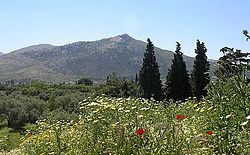Battle of Marathon-Η μάχη του Μαραθώνα
.jpg)
| Battle of Marathon | |||||||
|---|---|---|---|---|---|---|---|
| Part of the Greco-Persian Wars | |||||||
 The plain of Marathon today |
|||||||
|
|||||||
| Belligerents | |||||||
|
Athens, Plataea |
Persian Empire | ||||||
| Commanders and leaders | |||||||
|
Miltiades the Younger, Callimachus † |
Datis † Artaphernes |
||||||
| Strength | |||||||
|
9,000–10,000 Athenians, 1,000 Plataeans |
20,000–100,000 infantry and 1,000 cavalry (modern estimates) 600 ships, 200,000–600,000 infantry, and 10,000 cavalry (various ancient accounts) |
||||||
| Casualties and losses | |||||||
|
192 Athenians, 11 Plataeans (Herodotus) |
6,400 dead 7 ships destroyed (Herodotus) |
||||||
|
|||||
The Battle of Marathon (Greek: Μάχη τοῦ Μαραθῶνος, Machē tu Marathōnos) took place in 490 BC, during the first Persian invasion of Greece. It was fought between the citizens of Athens, aided by Plataea, and a Persian force commanded by Datis and Artaphernes. It was the culmination of the first attempt by Persia, under King Darius I, to subjugate Greece. The first Persian invasion was a response to Greek involvement in the Ionian Revolt, when Athens and Eretria had sent a force to support the cities of Ionia in their attempt to overthrow Persian rule. The Athenians and Eretrians had succeeded in capturing and burning Sardis, but were then forced to retreat with heavy losses. In response to this raid, Darius swore to burn down Athens and Eretria. At the time of the battle, Sparta and Athens were the two largest city states.
Once the Ionian revolt was finally crushed by the Persian victory at the Battle of Lade, Darius began plans to subjugate Greece. In 490 BC, he sent a naval task force under Datis and Artaphernes across the Aegean, to subjugate the Cyclades, and then to make punitive attacks on Athens and Eretria. Reaching Euboea in mid-summer after a successful campaign in the Aegean, the Persians proceeded to besiege and capture Eretria. The Persian force then sailed for Attica, landing in the bay near the town of Marathon. The Athenians, joined by a small force from Plataea, marched to Marathon, and succeeded in blocking the two exits from the plain of Marathon. A stalemate ensued for five days, before the Athenians decided to attack the Persians because, under the cover of night, some of the Persian fleet had set sail for Athens. Despite the numerical advantage of the Persians, thehoplites proved devastatingly effective against the more lightly armed Persian infantry, routing the wings before turning in on the centre of the Persian line.
The defeat at Marathon marked the end of the first Persian invasion of Greece, and the Persian force retreated to Asia. Darius then began raising a huge new army with which he meant to completely subjugate Greece; however, in 486 BC, his Egyptian subjects revolted, indefinitely postponing any Greek expedition. After Darius died, his son Xerxes I re-started the preparations for a second invasion of Greece, which finally began in 480 BC.
The Battle of Marathon was a watershed in the Greco-Persian wars, showing the Greeks that the Persians could be beaten; the eventual Greek triumph in these wars can be seen to begin at Marathon. Since the following two hundred years saw the rise of the Classical Greek civilization, which has been enduringly influential in western society, the Battle of Marathon is often seen as a pivotal moment in European history. For instance, John Stuart Millfamously suggested that "the Battle of Marathon, even as an event in British history, is more important than the Battle of Hastings". The Battle of Marathon is perhaps now more famous as the inspiration for the Marathon race. Although historically inaccurate, the legend of the Greek messengerPheidippides running to Athens with news of the victory became the inspiration for this athletic event, introduced at the 1896 Athens Olympics, and originally run between Marathon and Athens.
| Μάχη του Μαραθώνα | |
|---|---|
| Ελληνοπερσικοί Πόλεμοι | |
 Το πεδίο της μάχης σήμερα |
|
| Χρονολογία | Αύγουστος/Σεπτέμβριος 490 π.Χ |
| Τόπος | Μαραθώνας |
| Έκβαση | Αποφασιστική νίκη των Ελλήνων, λήξη της πρώτης περσικής εισβολής στην Ελλάδα |
| Μαχόμενοι | |
|
Αθήνα, Πλαταιές |
Περσική Αυτοκρατορία |
| Αρχηγοί | |
|
Μιλτιάδης, Καλλίμαχος† |
Δάτης, Αρταφέρνης |
| Δυνάμεις | |
|
9.000 – 10.000 Αθηναίοι, 1.000 Πλαταιείς |
20.000 – 100.000 πεζοί και 1.000 ιππείς (σύγχρονες εκτιμήσεις) 600 πλοία, 200.000 – 600.000 πεζοί, και 10.000 ιππείς (αρχαίες πηγές) |
| Απώλειες | |
|
192 Αθηναίοι, 11 Πλαταιείς (Ηρόδοτος) |
6.400 νεκροί 7 κατεστραμμένα πλοία (Ηρόδοτος)
|
Η Μάχη του Μαραθώνα (αρχαία ελληνικά Μάχη τοῦ Μαραθῶνος), που διεξήχθη τον Αύγουστο ή τον Σεπτέμβριο του 490 π.Χ, αποτελεί σύγκρουση μεταξύ των Ελλήνων (Αθηναίοι και Πλαταιείς) και των Περσών κατά την πρώτη εισβολή των Περσών στην Ελλάδα.
Μετά την αποτυχία της Ιωνικής Επανάστασης, ο Δαρείος συγκέντρωσε μεγάλη δύναμη για να εκδικηθεί την Αθήνα και την Ερέτρια, οι οποίες είχαν βοηθήσει τους Ίωνες. Το 492 π.Χ, έστειλε δύναμη, υπό την ηγεσία του Μαρδόνιου αλλά ο περσικός στόλος καταστράφηκε από τρικυμία παραπλέοντας τον Άθω. Τελικά το 490 π.Χ., υπό τη διοίκηση του Δάτη και του Αρταφέρνη, ο περσικός στρατός κατέλαβε τις Κυκλάδες, κατέστρεψε την Ερέτρια και στρατοπέδευσε στον Μαραθώνα, όπου τους αντιμετώπισε μια δύναμη Αθηναίων και Πλαταιέων. Η μάχη έληξε με αποφασιστική νίκη των Ελλήνων - που οφειλόταν στην στρατιωτική ιδιουϊα του Μιλτιάδη - και οι Πέρσες αναγκάστηκαν να φύγουν στην Ασία. Ο Δαρείος άρχισε να συγκεντρώνει και πάλι στρατό, αλλά πέθανε σε λίγο. Ο γιος του Ξέρξης επιχείρησε και εισέβαλε στην Ελλάδα (το 480 π.Χ), αλλά η εισβολή του έληξε με αποτυχία.
Η μάχη του Μαραθώνα έδειξε στους Έλληνες ότι μπορούσαν να νικήσουν τους Πέρσες. Κατά τους σύγχρονους ιστορικούς και μελετητές, η μάχη στον Μαραθώνα αποτελεί μια από τις σημαντικότερες στιγμές στην ιστορία της ανθρωπότητας - ο Edward Shepherd Creasy συμπεριλαμβάνει τη μάχη του Μαραθώνα στο έργο The Fifteen Decisive Battles of the World: from Marathon to Waterloo (Οι Δεκαπέντε πιο Αποφασιστικές Μάχες του Κόσμου: από τον Μαραθώνα στο Βατερλώ), ενώ ο Τζών Στιούαρτ Μιλ είχε δηλώσει ότι «η μάχη του Μαραθώνα αποτελεί σημαντικότερο γεγονός για τη βρετανική ιστορία από τη μάχη του Χάστινγκς».

